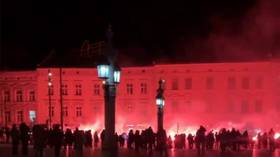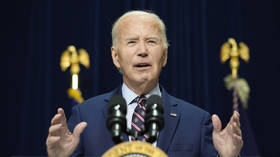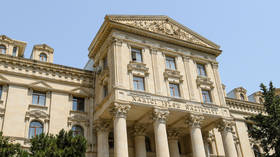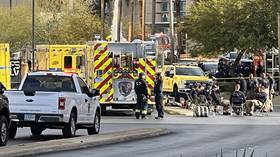US-funded Ukrainian radio defends neo-Nazi group, deletes article when called out
Radio Svoboda, the Ukrainian outpost of the US-funded Radio Free Europe, has taken issue with an article in the Israeli newspaper Haaretz critical of local neo-Nazis, only to delete its opus after coming under criticism.
Journalist Michael Colborne painted a grim picture of Ukraine’s violent extreme right. Colborne himself says he was attacked while covering a gay rights march in Kiev last November.
One group singled out by Colborne is C14, a neo-Nazi organization that began as an offshoot of the far-right ‘Svoboda’ (Freedom) party. Initially known as the National-Social party of Ukraine, Svoboda’s politicians have described the party as “the last hope of the white race,” approvingly quoted from ‘Mein Kampf’ in council meetings, and organized militant summer camps for children – training the young ones to play games, climb mountains, and shoot at Russians.
Also on rt.com Ukrainian neo-Nazi mob boss pictured next to Poroshenko in church inauguration ceremonyC14’s members prefer street-level activism, and celebrated Hitler’s birthday (April 20) last year by burning down a Roma gypsy camp in Kiev, and clubbing and pepper-spraying the fleeing Roma.
Colborne goes on to describe the countless other extremist groups active in Ukraine. Many took part in the 2014 Euromaidan protests, and more have since become involved in ‘legitimate’ politics. From the C14 yobs working with the country’s pro-Western health minister, to the ultranationalist Azov Battalion working with intelligence agencies and being officially incorporated into the Ukrainian National Guard, Ukraine has a serious Nazi problem on its hands.
One would expect Radio Free Europe – established in 1949 to promote the American message during the Cold War – to at least reject outright Nazism.
Not this time.
Well, this is amazing. The Ukrainian service of Radio Liberty, funded by the US Congress, runs a lengthy article to defend the C14 neo-Nazi group from an Israeli newspaper and its Canadian correspondent who was attacked by neo-Nazis in Kiev. https://t.co/W0Y0Z5akK3
— Leonid Ragozin (@leonidragozin) February 5, 2019
RFE/Radio Svoboda chose instead to pick apart Colborne’s article line by line. First, the station claimed that Colborne’s photos of racist graffiti in Kiev were written by “people who speak Russian as a foreign language,” hinting that the Nazi daubings were the work of foreign provocateurs.
1. They claim the way Д in the graffiti I photographed is atypical for someone who speaks Russian or Ukrainian natively, but 'sometimes drawn this way by people who speak Russian as a foreign language.' In other words - implying this piece of graffiti was a provocation? pic.twitter.com/cCXbvOGXxe
— Michael Colborne (@ColborneMichael) February 5, 2019
Then Radio Svoboda cast doubt on Colborne’s claim that he was assaulted at the LGBT rally, questioning why he didn’t mention the fact that the police immediately investigated the attack. The police opened an investigation, Colborne explained, but never followed the case up with him. Unsurprising, considering that the police in Kiev have been happy to allow Azov Battalion vigilantes to patrol the city’s streets, imposing “Ukrainian order.”
2. Correct, I didn't mention that criminal proceedings were immediately opened after the assault on me. Part of the reason I didn't mention that was so I wouldn't have to say this: I haven't heard a thing about these "proceedings" since then. Not one single, solitary word. pic.twitter.com/GG6pahhwkl
— Michael Colborne (@ColborneMichael) February 5, 2019
Moving on to defend C14, Radio Svoboda claimed that the Roma camp attack didn’t actually take place on Hitler’s birthday, despite the fact the Radio Free Europe’s English language service reported the attack happening “overnight on April 20-21.” The incident was also condemned by Ukraine’s usually complicit government, and by Amnesty International, who claimed C14 operate with “full impunity.”
3. The C14 assault on the Roma camp on April 20 - Hitler's birthday - didn't happen on that day, they say. Come on, guys: your own English-language counterparts say it was "attacked overnight on April 20-21 by more than a dozen members of the far-right nationalist group C14." pic.twitter.com/wIhlVqAROd
— Michael Colborne (@ColborneMichael) February 5, 2019
Instead of assaulting the gypsies and burning their homes, Radio Svoboda insists that the “masked attackers throwing rocks and spraying gas” politely asked the Roma to pack up and move on.
4. Also, apparently this attack that everyone else calls an attack was merely "a demand that the Roma move out." Guys, seriously? This was on video - a video showing "masked attackers throwing rocks and spraying gas," according, again, to your English-language counterparts. pic.twitter.com/n0NpdtT4t5
— Michael Colborne (@ColborneMichael) February 5, 2019
And when looking for sources to disagree with Colborne, Radio Svoboda got in touch with none other than the National Corps, a far-right party formed in 2016 by Azov Battalion veterans.
5. Apparently there are people who disagree with me. Fine - so who'd you talk to? Someone from National Corps. OK? pic.twitter.com/qJ694NvxFD
— Michael Colborne (@ColborneMichael) February 5, 2019
Radio Svoboda deleted the article, explaining that it did not comply with editorial standards. An archived version can still be found though, in which the author blames the rising tide of anti-Semitic attacks in Ukraine on...wait...you guessed it: Russia.
With Radio Svoboda covering for neo-Nazis, the Ukrainian government has made few attempts to hide its sympathies for the fascist past. The country’s parliament made the birthday of Nazi collaborator Stepan Bandera a national holiday in December, and thousands of Ukrainians celebrated the day with a torchlit procession through the streets of Kiev on New Year’s Day.
Subscribe to RT newsletter to get stories the mainstream media won’t tell you.















